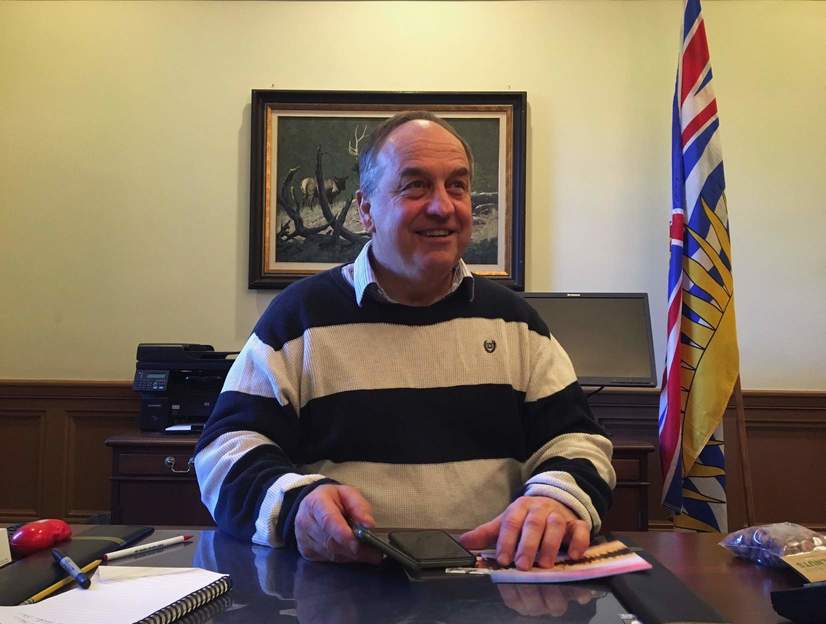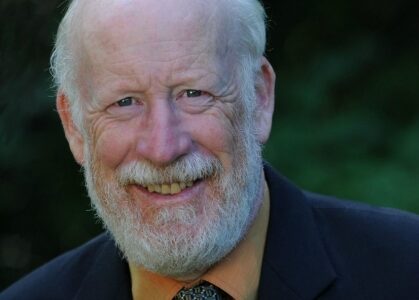10 Questions with BC Green Party Leader Andrew Weaver
By Carol Linnet of DeSmog Canada
B.C. Green Party leader Andrew Weaver went from being B.C.’s solitary Green MLA in 2013 to holding the balance of power in the province’s current minority government.
While the transition has had its ups and downs for the climate scientist, public scrutiny of Weaver’s position and what he ought to do with his influence in government hit an all-time high recently with government’s decision to forge ahead with the controversial Site C dam.
We caught up with Weaver at his office in the legislature to ask him to reflect on the last seven months of cooperation with the NDP government and what he anticipates 2018 holds for some of B.C.’s most pressing energy and environment concerns.
This interview has been edited for length and clarity.
1) It’s been seven months since you signed a confidence and supply agreement with the NDP. Has that arrangement unfolded as you expected?
I’ve been very pleasantly surprised. I went into this agreement very skeptical about our ability to work with the NDP…[but] we recognized that what was critical for us was that we wanted to give people change. We put together this agreement that gave British Columbians certainty, articulated some key values both parties shared…When we started our negotiations it was pretty tense. When we ended it we ended up really getting to know each other and it was quite positive.
It wouldn’t have happened if there wasn’t a general willingness of both parties to put the interest of British Columbians first. There are areas where we disagree, like Site C dam — an obvious one. But in the end we agree to disagree and we understand that’s healthy. We can disagree and move on. It doesn’t mean we have to throw a hissy fit and make government fall.
2) It’s been a raucous time environmentally for this province. There have been some notable highs and lows. What are you most proud of?
One of the things I felt was a deal breaker for me in the negotiations [with the NDP] was climate policy and we all know underpinning any climate mitigation policy is increasing carbon pricing. To me it was a big victory that we had an increase in carbon price of $5 a year, starting in the April budget for four years … which will take us ahead of Trudeau’s target. So we have both leadership and certainty. To me that was a high point.
There were some other good things: we had a ban on grizzly hunting. I know it’s a bit populist and I know there were some people who are concerned because it wasn’t science based and we’ve been advocating for a science-based approach to ecosystem management…but dealing with grizzlies was a good thing.
3) What has emerged as a memorable low point?
Site C.
In addition, we still haven’t seen any action on fish farms. That to me is a critical one and we’re hoping to see something in the spring on that as these tenures come to. We’ll be pressuring government to take a hard look at the renewal of those tenures because they’re on the record saying they’re going to get fish [farms] out of the migratory path of sockeye.
The biggest issue that we’re working on right now is restructuring the professional reliance model to get industry out of the business of policing themselves.
We have a model where industry hires professional consultants to provide the underlying evidence that a proponent of a project will send into the environmental assessment process. We have a problem there.
We’re tackling that. We’ve got that public consultation process going on now. We’re hoping to see some movement going forward in that area.
The [example of professional reliance] that is most personal and relevant and local is of course the Shawnigan case.
The Shawnigan residents believed and frankly rightly so that government was abdicating its role to actually look out for the betterment of all people and letting industry in some sense police itself. So in that particular case we know the professional reliance engineering group were actually partners in the project and there was some conflict there and that’s all before the courts now.
Another example is Mount Polley. Again, when government is not there enforcing compliance and ensuring regulations are met and ensuring public oversight of these projects, things happen and the public loses trust.
Two other projects that stand out are Kinder Morgan and the Ajax mine.
4) On the subject of the Ajax mine, government recently announced it would not issue permits for that project but was cautious to say the decision was not the result of Indigenous veto. What do you make of this government’s promise to uphold Indigenous rights in this province?
We campaigned on this. We would introduce a Natural Resources Board and part of that board’s process would be to ensure when you’re doing an environmental assessment the process is actually modified through legislation to include assessments based on Indigenous values.
We know from the Tsilhqot’in case there are substantive issues with ignoring the wishes of First Nations. So our process would have involved changing the environmental assessment process to ensure as part of that process Indigenous input is there. Not in terms of a veto, and Indigenous peoples don’t talk in terms of a veto either, but in terms of ensuring their collective wisdom is looked at. It’s not that difficult to do: you have an environmental assessment process, you just need to expand the mandate of that but you also have to bring the actual collection of information and oversight into government too so you’re not letting industry choose which First Nation to consult. You’d have a Natural Resources Board that would have a broader oversight that would actually ensure any assessment process went through a process that had indigenous involvement as well.
It’s not easy but it’s what we need to do.
5) We recently put together a list of resource projects that got it right in 2017. What would you put on that list?
The Valemount geothermal project.
I spent ages pushing that project from the inside because there was an MOU sitting on the minister’s desk, waiting and waiting and waiting. All it needed was to get signed but BC Hydro didn’t want the power. So now they’ve got the exploration permit to get going … but it’s not only the Borealis project in Valemount, it’s also Glacier Destinations, which is a ski resort that’s going to happen there. It’s the exact opposite of Jumbo: the First Nations and the town went together to the architects of the Jumbo resort and said ‘we want this.’ And you have community support for geothermal.
Everybody wins.
6) Do you think more small-scale, local energy projects are in store for B.C.?
It’s the way of the future. It’s not only the way of the future, it’s the reason I got into politics.
When you build distributed renewable energy resources you’re putting them in small communities all across B.C. in partnership with First Nations, you’re getting these First Nations off diesel, you’re bringing long-term stable jobs into the communities. You’re not just building construction projects with no jobs at the end. There are so many examples whether in Tofino, Port Alberni, Lytton, where there have been very successful small-scale hydro projects done in partnership with First Nations.
We know right now there’s proposals for solar in Cranbrook, hopefully Borealis geothermal, wind projects all over the place and pumped storage. They’re all ready to go but in B.C. there’s only one purchaser of power: BC Hydro. So none of them can go ahead unless BC Hydro says we will take that power from you but BC Hydro is building Site C and Site C is taking up any increase in demand for the foreseeable future.
7) What impact do you expect the approval of Site C to have on the renewable energy industry in B.C.?
A few days ago I received an e-mail from a CEO of a renewable energy company that is B.C.-based and they’re essentially saying Site C has killed their industry.
It’s not only him — I’ve heard that time and time again, that people have come to B.C. to invest in the renewable energy potential here and now they feel they have been thrown under the bus. There’s a reason the Canadian Wind Energy Association left B.C., went to Alberta and look what we see: 600 MW of power coming in at 3.7 cents per kilowatt hour. That’s the opportunity we lost.
8) You know a lot of people said the Site C decision should have been the moment the Green party used its position to bring down government. Did you consider that decision and why?
Not for a second.
Even before the decision I let people know that we’re not going to make government fall over whatever decision they made.
The question I would ask people is how would that have changed the outcome? If we caused government to fall on a vote … a budget amendment or confidence vote … government would fall, there would be an election probably by May or June and we’d have spent another $1 billion on Site C.
So what’s the possible results we could get? A majority Liberal government — Site C goes forward. Majority NDP government — Site C goes forward. Minority government — we’re back at the negotiating table.
The reason we didn’t put it in the confidence agreement is that’s not how you develop partnerships. You don’t put a gun to someone’s head … we accepted the NDP’s argument that we would send this to the BCUC. We were comfortable with that because we knew what the BCUC would say. We were delighted with that report. They had everything they needed to cancel it.
9) You’ve said before that with the approval of Site C your party will push for a greater electrification of B.C.’s systems. Is that something you’ll be turning your attention toward in 2018?
We’re already pushing for the introduction of an aggressive zero emission vehicle standard. We need BC Hydro to step up and start to bring in the infrastructure for electric. We need to change legislation and regulatory structure in B.C. to allow people to charge for power in charging stations.
Industry wants to invest in charging stations but they can’t sell the power unless they’re a utility. It starts to become bureaucratic. We will push for electrification. What else can we do?
10) Energy and environment issues are quickly evolving from transitions in energy markets to evolving perspectives on Indigenous rights. One industry that has been affected by these changes is the LNG industry. What is your take on LNG for 2018?
If B.C. starts to focus again on trying to land an LNG industry given all that has happened, I can tell you I am voting government down. I am not standing by no matter when it happens. I am not standing by and watching us give away the farm yet again to land an industry we’re not competitive in. That’s my line in the sand.
LNG is gone because we know global markets, China is over supplied in their contracts. For some time there is no supply gap that needs to be filled.
This is the opportunity to capitalize on the new economy. Given our stable democracy in unstable times, given our access to clean energy and businesses around the world that want to label themselves clean, if we go down this LNG path and start to sign sweet deals again then we might as well have the BC Liberals back in power.

























Comments